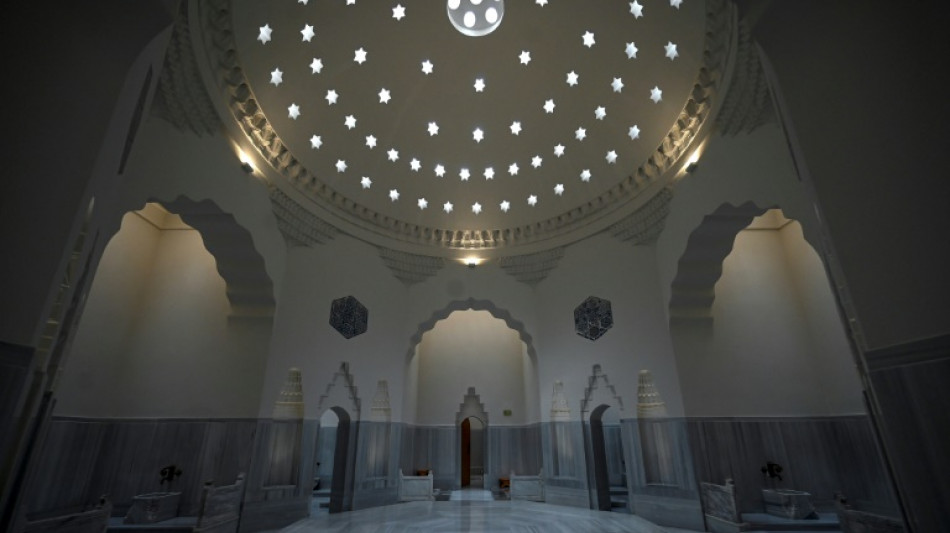
-
 Home hero Wu wows Shanghai crowds by charging to China Open win
Home hero Wu wows Shanghai crowds by charging to China Open win
-
Less Soviet, more inspiring: Kyrgyzstan seeks new anthem

-
 Defending champion Kyren Wilson crashes out in first round of World Snooker Championship
Defending champion Kyren Wilson crashes out in first round of World Snooker Championship
-
NASA's oldest active astronaut returns to Earth on 70th birthday

-
 Exec linked to Bangkok building collapse arrested
Exec linked to Bangkok building collapse arrested
-
Zelensky says Russian attacks ongoing despite Putin's Easter truce

-
 Vaibhav Suryavanshi: the 14-year-old whose IPL dream came true
Vaibhav Suryavanshi: the 14-year-old whose IPL dream came true
-
Six drowning deaths as huge waves hit Australian coast

-
 Ukrainian soldiers' lovers kept waiting as war drags on
Ukrainian soldiers' lovers kept waiting as war drags on
-
T'Wolves dominate Lakers, Nuggets edge Clippers as NBA playoffs start

-
 Taxes on super rich and tech giants stall under Trump
Taxes on super rich and tech giants stall under Trump
-
Star Wars series 'Andor' back for final season

-
 Neighbours improvise first aid for wounded in besieged Sudan city
Neighbours improvise first aid for wounded in besieged Sudan city
-
Tariffs could lift Boeing and Airbus plane prices even higher

-
 Analysts warn US could be handing chip market to China
Analysts warn US could be handing chip market to China
-
Unbeaten Miami edge Columbus in front of big MLS crowd in Cleveland

-
 Social media helps fuel growing 'sex tourism' in Japan
Social media helps fuel growing 'sex tourism' in Japan
-
'Pandora's box': alarm bells in Indonesia over rising military role

-
 Alaalatoa hails 'hustling hard' Brumbies for rare Super Rugby clean sheet
Alaalatoa hails 'hustling hard' Brumbies for rare Super Rugby clean sheet
-
Trio share lead at tight LA Championship

-
 Sampdoria fighting relegation disaster as old heroes ride into town
Sampdoria fighting relegation disaster as old heroes ride into town
-
Recovering pope expected to delight crowds at Easter Sunday mass

-
 Nuggets edge Clippers in NBA playoff overtime thriller, Knicks and Pacers win
Nuggets edge Clippers in NBA playoff overtime thriller, Knicks and Pacers win
-
Force skipper clueless about extra-time rules in pulsating Super Rugby draw

-
 DEA MARIJUANA SCAM: As DEA Cannabis Program Implodes This 4/20, MMJ Stands Alone in Pursuit of Real Medicine
DEA MARIJUANA SCAM: As DEA Cannabis Program Implodes This 4/20, MMJ Stands Alone in Pursuit of Real Medicine
-
Nuggets edge Clippers in NBA playoff overtime thriller, Pacers thump Bucks

-
 Unbeaten Miami edge Columbus in front of big crowd in Cleveland
Unbeaten Miami edge Columbus in front of big crowd in Cleveland
-
Kim takes one-shot lead over Thomas, Novak at RBC Heritage

-
 Another round of anti-Trump protests hits US cities
Another round of anti-Trump protests hits US cities
-
'So grateful' - Dodgers star Ohtani and wife welcome first child

-
 PSG maintain unbeaten Ligue 1 record, Marseille back up to second
PSG maintain unbeaten Ligue 1 record, Marseille back up to second
-
US, Iran report progress in nuclear talks, will meet again

-
 US Supreme Court intervenes to block Trump deportations
US Supreme Court intervenes to block Trump deportations
-
Hamas armed wing says fate of US-Israeli captive unknown

-
 Pacers thump Bucks to open NBA playoffs
Pacers thump Bucks to open NBA playoffs
-
Sabalenka reaches Stuttgart semis as Ostapenko extends Swiatek mastery

-
 Zelensky says Ukraine will observe Putin's Easter truce but claims violations
Zelensky says Ukraine will observe Putin's Easter truce but claims violations
-
'Fuming' Watkins fires Villa in bid to prove Emery wrong

-
 DR Congo boat fire toll revised down to 33
DR Congo boat fire toll revised down to 33
-
England thrash Scotland to set up France Grand Slam showdown

-
 Verstappen's Red Bull 'comes alive' to claim record pole in Jeddah
Verstappen's Red Bull 'comes alive' to claim record pole in Jeddah
-
McTominay fires Napoli level with Inter as Conte fuels exit rumours

-
 Rajasthan unleash Suryavanshi, 14, as youngest IPL player but lose thriller
Rajasthan unleash Suryavanshi, 14, as youngest IPL player but lose thriller
-
Man City boost top five bid, Aston Villa thrash in-form Newcastle

-
 Villa rout Newcastle to rekindle bid to reach Champions League
Villa rout Newcastle to rekindle bid to reach Champions League
-
Dumornay gives Lyon lead over Arsenal in Women's Champions League semis

-
 Trans rights supporters rally in London, Edinburgh after landmark ruling
Trans rights supporters rally in London, Edinburgh after landmark ruling
-
'We have to wait': Barca's Flick on Lewandowski injury fear

-
 Bordeaux-Begles backups edge Pau to close in on Top 14 summit
Bordeaux-Begles backups edge Pau to close in on Top 14 summit
-
Trans rights supporters rally outside in London, Edinburgh after landmark ruling


Istanbul's historic baths keep hammam tradition alive
For centuries, hammams were central to Ottoman society, and while they fell out of use in Turkey with the advent of running water, many are being restored to revive an ancient ritual bathing tradition.
Often featured in older Turkish films, hammam scenes are highly entertaining, with women not only bathing but enjoying these historical bathhouses as a place to socialise, eat, drink and even dance.
Last year, the 500-year-old Zeyrek Cinili Hammam -- built during the reign of Suleiman the Magnificent by the celebrated Ottoman architect Sinan -- reopened to the public after a painstaking 13-year restoration.
Alongside a functioning hammam, it also houses a museum explaining its history and the Ottoman ritual of bathing.
"The restoration somehow turned into an archaeological dig" that gave insight into how the hammam once looked, museum manager Beril Gur Tanyeli told AFP.
"Around 3,000 pieces of missing tiles were found which helped solve the puzzle of why this hammam was called Cinili" -- Turkish for "covered with tiles".
The beautiful Iznik tiles that once lined its walls were exclusively produced for the hammam, with no other bathhouse having such a rich interior, museum officials say.
Although most were damaged by fires or earthquakes, or sold off to European antique dealers in the 19th century, some are still visible.
The restoration also exposed several Byzantine cisterns beneath the hammam.
"Sinan the Architect is believed to have built the hammam on top of these cisterns to use them as a foundation and as a source of water," Tanyeli said.
- From cleansing to celebration -
In ancient Rome, bathing culture was very important and it was "traditional for traders to wash before entering the city, especially in baths at the (city) entrance," archaeologist Gurol Tali told AFP.
During the Ottoman empire, bathing culture had its golden age, with the ritual symbolising both bodily cleanliness and purity of soul.
In Islam, a Muslim must wash before praying, in an act known as ablution.
Hammams were also a place for celebrating births and weddings.
"Baths were used not only for cleansing the body but for socialising, relaxing, healing and even celebrating important life events," with special rites for brides, soldiers and those who had undergone circumcision, Tali said.
Since households at the time did not have running water, hammams were an essential part of life until the 19th century, with census figures from 1638 showing there were 14,536 public and private baths in Istanbul, the museum says.
And that tradition has survived until today.
"You come here to get clean and leave handsome," said Zafer Akgul, who was visiting one of the city's hammams in the city with his son, telling AFP he visited often, particularly during religious feasts or for a wedding.
"We don't want this tradition to die."
- 'Passing on cultural heritage' -
That is where Istanbul's ancient hammams can serve a bigger purpose, Tali said.
"Restoring historical baths in Istanbul and putting them to use may be the most effective way to transfer cultural heritage to future generations," he said.
Another nearby bath house from the same era, the Beyazid II Hammam, underwent years of restoration and reopened as a museum in 2015.
One of the largest hammams in the city at the time, some historians believe it was where a notorious male bathing attendant, or "tellak", called Halil plotted an uprising that in 1730 overthrew Sultan Ahmed III.
For Manolya Gokgoz, who does publicity for Cemberlitas Hammam, another 16th-century bathhouse built by the royal architect Sinan, the connection is more personal: her grandmother worked there as a "natir" -- a woman's bathing attendant.
"When I was two or three years old, I would go to the baths in the morning, wash and play by myself until the evening without getting bored," she told AFP.
For Gokgoz, the tradition lives on -- although mostly among tourists, which for her is a shame.
"In the past, we used to go to the hammam with our mothers and grandmothers. Now 70 percent of our customers are foreign tourists and 30 percent locals," she said.
These days, the hammam experience -- which lets bathers relax in hot, warm or cool pools alongside extras like massages or peeling -- is quite expensive, with the basic service costing around $100.
Celebrities, both Turkish and international, often visit Cemberlitas, with the last being Spanish actor Pedro Alonso -- the character Berlin in the Netflix hit "Money Heist" -- who visited in September.
"Hammam is not a luxury, but a need," Gokgoz said.
"Yes, it's not like in the past because we have hot water at our fingertips, but we need to keep this tradition alive."
P.Martin--AMWN

